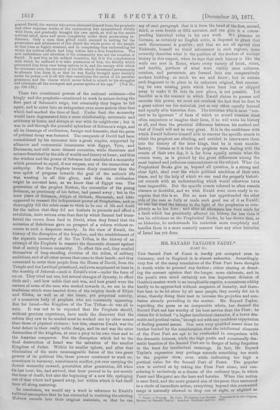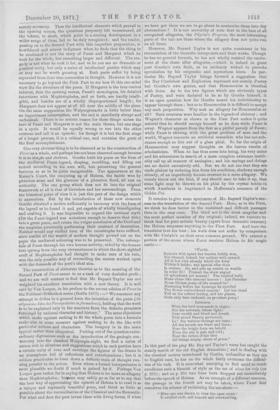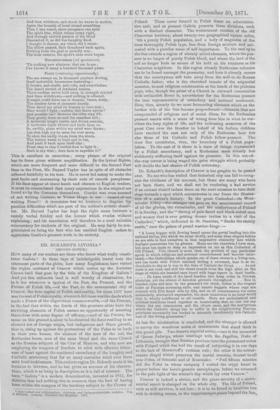MR. BAYARD TAYLOR'S FAUST.*
(PART IL)
Tag Second Part of Faust is hardly yet accepted even in Germany, and in England it is almost unknown. Accordingly very few of the many translators of the First Part have thought it worth while to proceed any farther ; either sharing or dread- ing the current opinion that the longer, more elaborate, and in the poet's own mind certainly not leas important division of Goethe's master-work is an inexplicable caprice, a monstrous oddity hardly to be approached without suspicion of insanity, and there- fore best to be let alone by all sane people, they mostly did let it alone, thereby doing their best to increase the prejudice and con- fusion already prevailing in the matter. Mr. Bayard Taylor, regarding the poem as an inseparable whole, has deemed the Second Part not less worthy of his best service than the First ; he claims for it indeed "a higher intellectual character, if a lower dra- matic and poetical value," though not with any confident expectation of finding general assent. Our own very qualified assent must be further limited by the consideration that the intellectual elements of the First Part are apt to be overlooked in comparison with the dramatic interest, while the high poetic and occasionally dra- matic beauties of the Second Part are in danger of being forgotten in the hunt for intellectual meanings. In fact, Mr. Bayard Tay)or's expression may perhaps concede something too much to the popular view, even while indicating too high a poetical value for the Second Part of Faust. The popular view is arrived at by taking the First Part alone, and con- sidering it exclusively as a drama of the ordinary type, in which Faust and Margaret are the hero and heroine. When this notion is once fixed, and the more general aim of the poem thus narrowed to a circle of immediate action, everything beyond this contracted range is naturally allowed to drop out of sight, or slighted as * Raul; a Trayerly. By John Wolfgang Ton Goethe. Translated in the Origtua4 Metres, by Bayard Taylor. Loudon: Strahan and Co. 1871.
merely accessory. Thus the intellectual elements which prevail in the opening scenes, the questions purposely left unanswered, all the tokens, in short, which point to a coming development in a wider range of ideas, fail to be duly recognized ; and the reader, passing on to the Second Part with this imperfect preparation, is bewildered and almost indignaut when he finds that the thing to be continued is not the story of Faust and Margaret which he took for the whole, but something larger and different. The tra- gedy is not what he took it for, and so he can see no dramatic or poetical unity, but only a series of intellectual puzzles which may or may not be worth guessing at. Both parts suffer by being separated from their true connection in thought. However it is not necessary to go beyond the First Part to see how ill this one-sided view fits the structure of the poem If Margaret is the true central interest, then the opening scenes, Faust's monologues, his detailed interviews with Mephistopheles, and so forth, are hardly intelli- gible, and besides are of a wholly disproportioned length ; for Margaret does not appear at all till near the middle of the piece. On the same supposition the Walpurgisnacht is little better than an impertinent interruption, and the end is manifestly abrupt and unfinished. There is no artistic reason for these things unless the love of Faust and Margaret is not the main theme, but one stage in a cycle. It would be equally wrong to run into the other extreme and call it an episode ; for though it is but the first stage of a longer process, it is a critical one, and contains the germ of the final accomplishment.
One very obvious thing is to be observed as to the construction of Faust as a whole, and perhaps has not been observed enough because it is so simple and obvious. Goethe built his poem on the lines of the mediawal Faust-legend, shaping, moulding, and filling out indeed according to his own will, but preserving the general features so as to be quite recognizable. The appearance at the Kaiser's Court, the conjuring up of Helena, the battle won by phantom arms and the glamour of a phantom flood, all rest on authority. The one group which does not fit into the original framework at all is that of Gretchen and her surroundings. From the historical point of view it is just this part of the design which is anomalous. But by the introduction of these new elements Goethe obtained a motive sufficiently in harmony with the form of the legend as he found it and yet capable of wholly transfiguring and exalting it. It was impossible to expand the national myth (for the Faust-legend was notorious enough to deserve that title) into a great poem, and retain the vulgar conclusion of the Devil and the magician punctually performing their contract of damnation. Neither would any violent turn of the catastrophe have sufficed, since amidst all the wealth of modern thought ponred out on the poem the inediteval colouring was to be preserved. The redemp- tiOn of Faust through his own human activity, aided by the human love sprung from the very circumstances in which the short-sighted craft of Mephistopheles had thought to make sure of his ruin, was the only possible way of reconciling the matter worked upon with the demands of the poet's ideal aim.
The construction of elaborate theories as to the meaning of the Second Part of Foot seems to us a task of very doubtful profit ; and we are well content to find that Mr. Bayard Taylor has not weighted his excellent translation with a new theory. It is well said by Von Loeper, in his preface to the recent edition of Faust in the National-Bibliothek series (Berlin 1870) :—" We renounce any attempt to define in a general form the intention of the poem (die 411gemeine Idee des Faustgedields zuformuliren), holding that the work is to be explained only in the concrete from the definite premisses furnished by national character and history." The same objections which make against seeking to fit the whole poem into a formula wake also in some measure against seeking to do the like with particular actions and characters. The imagery is in the main typical rather than allegorical. Putting out of the question extra- ordinary digressions such as the introduction of the geologic con- troversy into the classical Walpurgis-night, we find a series of scenes rich in allusions and suggestions which in each portion have a certain unity of tone and envelope the figures of the drains in an atmosphere full of reflections and reverberations ; but it is seldom practicable to hunt down a definite train of thought run- ning parallel to the action. Even where a formal interpretation is most plausible we doubt if much is gained by it. Perhaps Von Loeper goes rather far in saying that Helena is no more an allegory than Mephistopheles ; balloon° may safely go so far as to say that the best way of appreciating the episode of Helena is to read it as • a unique and supremely beautiful poem, and think as little as possible about the reconciliation of the Classical and the Romantic. For what end does the poet invest ideas with living forms, if when we have got them we are to go about to anatomize them into dry abstractions ? It is not unworthy of note that in the beat of all recognized allegories, the Pilgrim's Progress, the most interesting parts of the tale are those where the allegory does not quite run on all fours.
However, Mr. Bayard Taylor is not quite consistent in his renunciation of the theoretic interpreters and their works. Though he has no general formula, he has not wholly resisted the excite- ment of the chase after allegories,—which is indeed in great part Goethe's own fault, as lie evidently wished to provoke speculation by his enigmatic and mysterious hints. In par- ticular Mr. Bayard Taylor brings forward a suggestion that the Boy Charioteer and Euphorion represent not merely Poetry but Goethe's own genius, and that Homunculus is identical with them. As to the two figures which are obviously types of Poetry, and were declared to be so by Goethe himself, it is an open question how far Goethe meant his individuality to appear through them ; but as to Homunculus it is difficult to accept any such proposition. Why seek an allegory for Honauuculus at all? Such creatures were familiar in the legends of alchemy ; and Wagner's character as shown in the First Part makes it quite natural that he should occupy himself as he does while Faust is away. Wagner appears from the first as a pitiful parody of Faust ; while Faust is striving with the great problem of man and the world, Wagner concocts an artificial mannikin who has not sub- stance enough to live out of a glass phial. So far the origin of Homunculus may suggest thoughts on the barren results of scholasticism. When he has thus come into being, his very name and his adventures in search of a more complete existence inevit- ably call up all manner of analogies ; and his sayings and doings are no doubt excessively odd. But we do not see that they are made plainer by reducing him from his condition, shadowy enough already, of an imperfectly human creature to a mere allegory. We merely throw out the hint, if any should care to take it up, that some light may be thrown on his phial by the crystal bottle in which Anselmus is imprisoned in Hoffmann's romance of the Golden Pot.
It remains to give some specimens of Mr. Bayard Taylor's suc- cess in the translation of the Second Part. Here, as in the First, we think he does better in the sustained and difficult passages than in the easy ones. The third act is the most singular and the most perfect member of the original ; indeed, we venture to think that for pure artistic beauty (apart from dramatic iuterest) the Heleua surpasses anything in the First Part. And here the translator is at his best ; his work does not suffer by comparison with Mr. Carlyle's on their even common ground. We extract a portion of the scene where Faint. receives Helena in his magic castle :--
"FAUST.
Remove with speed the burden boldly won, Not blamed, indeed, but neither with reward. All is her own already which the keep Within it holds; and special offer thus Is useless. Go, and pile up wealth on wealth In order fit! Present the show august Of splendours yet unseen I The vaulted halls Make shine like clearest heaven ! Let Paradise From lifeless pomp of life created be! Hastening before her footsteps be unrolled The flower-embroidered carpets ! Let her tread Fall on the softest footing, and her glance, Gods only bear undazed, on proudest pomp!
LYNCEUS.
What the lord commands is slight; For the servants, labour light: Over wealth and blood and breath This proud Beauty governoth. Lo! thy warrior-throngs are tame ; All the swords are blunt and lame; Near the bright form we behold Even the sun is pale and cold ; Near the riches of her face
All things empty, shorn of grace."
In this part of the play Mr. Bay ard Taylor's verse has caught the stately march of the old English dramatists ; and in dealing with
the classical metres introduced by Goethe, unfamiliar as they are to English ears, he has on the whole fairly overcome the difficul- ties of his task. It is somewhat annoying to find amid so much excellence such a blemish of style as the use of alone for only (on p. 235) ; and on p. 234 two lines have dropped out immediately before the speech of Helena. As an example of a different manner, the passage in the fourth act may be taken, where Faust first conceives his scheme of reclaiming the sea-shore:—
" Mine eye was drawn to view the open ocean : It swelled aloft, self-heaved and overvaulting,
And then withdrew, and shook its waves in motion, Again the breadth of level strand assaulting.
Then I was vexed, since arrogance can spite The spirit free, which values every right, And through excited passion of the blood Discomfort it, as did the haughty flood.
I thought it chance, my vision did I strain : The billow paused, then thundered back again, Retiring from the goal so proudly won : The hour returns, the sport's once more begun.
MENITSTOPLIEL148 (ad spectatores).
'Tis nothing now whatever that one boars; I've known it many a hundred thousand years.
FAVST (coratnuing impassionedly).
The sea sweeps on, in thousand quarters flowing, Itself unfruitful, barrenness bestowing ; It breaks, and swells, and rolls, and overwhelms, The desert stretch of desolated realms.
There endless waves hold sway, in strength erected And then withdrawn,—and nothing is effected.
If aught could drive me to despair, 'twore, truly, The aimless force of elements unruly.
Then dared my mind its dreams to over-soar ; Here would I fight,—subdue this fierce uproar ! And possible 'tie I Howe'or the Odom may fill, They gently fawn around the steadfast hill ; A moderate height resists and drives asunder, A moderato depth allures and leads them on.
So, swiftly, plans within my mind were drawn ; Let that high joy be mine for ever more, To shut the lordly Ocean from the shore, The watery waste to limit and to bar, And push it back upon itself afar ; From step to step I settled how to fight it ;
Such is my wish ; dare thou to expedite it r
This is excellent in execution ; every phrase of the original has its force given without amplification. In the lyrical flights, which are more frequent and more difficult in the Second Part than in the First, Mr. Bayard Taylor has in spite of all obstacles adhered faithfully to his text. Ho is never led astray to make the poet facile and unmeaning by short cuts of smooth paraphrase. If his lines appear at times harsh and obscure to English readers, it must be remembered that many expressions in the original are found so by the Germans themselves. Goethe was even accused of not writing German, as Victor 1-1ugo is no mused of not
writing Frew,' A translator has no busineNs to disguise the
peculiar difficulties which are part of the author's artistic charac- ter. Mr. Bayard Taylor has kept the right mean between a merely verbal fidelity and the licence which evades witbout explaining ; and his translation will therefore be a most valuable commentary for students of the original. He may fairly be con- gratelated on being the first who has enabled English . &Wets to appreciate Goethe's greatest work in its entirety.




































 Previous page
Previous page